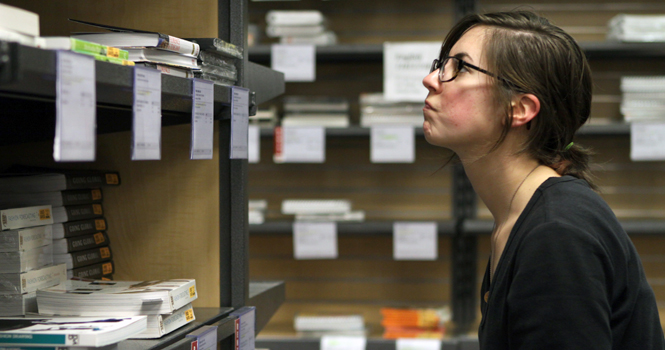Some students opt out of buying books
Adrienne Langan, 21-year-old fashion merchandising major, searches for a book at the campus book store in the Student Center on Tuesday. Students, with receipts, can return books for a full refund up until Jan. 17. Photo by Coty Giannelli.
January 19, 2012
With high prices for classes and materials, Kent State University students often try to find ways to get good grades without books or other supplies.
Peter Nogay, sophomore architecture major, said he didn’t buy books for several of his classes including: physics, computer applications in architecture and art history 1 and 2.
“Kent State makes me pay too much money,” Nogay said when asked why he didn’t buy his books even though most were required for class.
Yet, Nogay said he found ways to do well in class without his books, earning a 3.1 average GPA.
“Most of the time, the books required are for reading assignments,” Nogay said. “And you can kind of just assume what the reading’s about because the topics in class come up, and they pretty much tell you what the reading is before you do it.”
However, he said he wouldn’t recommend just not buying books for class. Instead, he said to ask around before deciding what to do.
“Normally in architecture, you can kind of ask the older kids because they are right next to us all the time, so they’ll tell you if you don’t really need the book, if you can get by without it,” Nogay said. “So definitely ask around, get some information before you make decisions like that.”
Still, some students don’t buy other supplies for their classes. Matthew Liderbach, junior fine arts major, said he either used old art supplies or borrowed some of his supplies for his classes.
“It’s all like small stuff, you know, like ink, pencils, that sort of thing,” Liderbach said. “So it’s not a matter of borrowing someone’s $200 textbook or graphing calculator or something like that.”
Liderbach said he did well in his classes, receiving A’s and B’s, even though he didn’t always have the supplies.
“Being these are art classes, you’re graded more on your creativity and, I guess, like, your work ethic and stuff like that as opposed to what materials you have,” Liderbach said. “You know, I think, you can still make a good drawing. You can still get a good grade regardless of how you make it.”
Jon Secaur, assistant professor of physics, said he recommends the book for his class because it will give students a “deeper understanding of the topics they discuss,” but doesn’t require it to help students financially.
“College is so expensive already. I like to make it as economical as I possibly can,” Secaur said. “So I don’t require it for that reason. I do recommend the book because it gives a richer deeper experience, and you’re going to learn more if you have the book.”
Secaur, who bought all of his textbooks while in college, said he suspects that how well students perform in class is based more on their personalities and work ethic rather than if they bought the books or not.
“A lousy student who buys the book is still going to do bad because you have to read the book and you have to integrate what it says,” Secaur stated. “So simply buying the book and leafing through it once in a while won’t do much.
On the contrary, the opposite pole would be somebody who is smart, comes to class, takes notes, understands, asks questions, doesn’t buy the book, but will still do fine and will probably learn a lot too.”
Contact Alicia Balog at [email protected].












